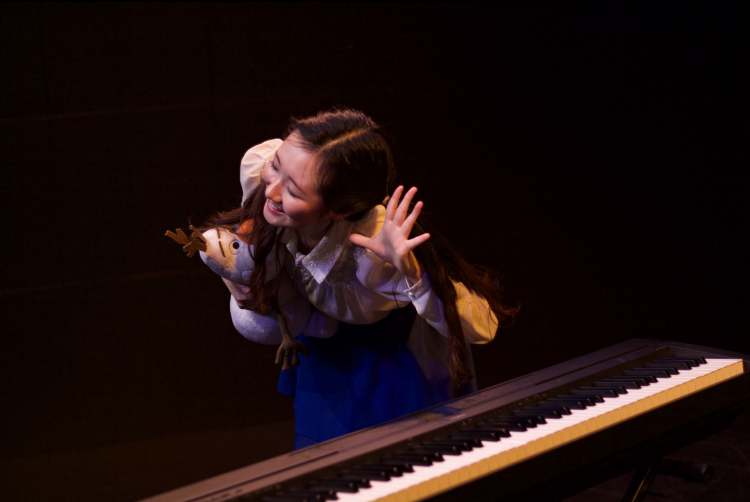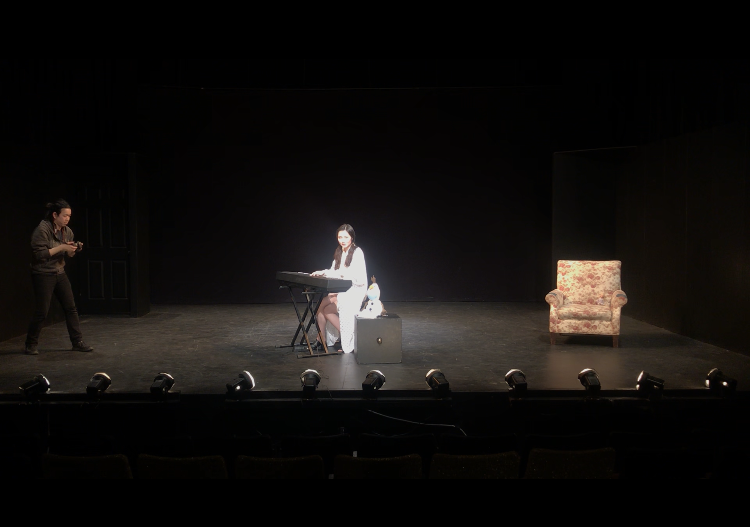Deep dive into the world of Ella Sodam Yoon
Welcome Ella Sodam, we are very excited to have you today with us to discuss about your work.
Who is Ella Sodam Yoon and how did the passion for creating begin?
I am a musical theater composer/arranger and writer from South Korea. My passion for creating began in 2017 in college. I started with a short song seed of 8 bars that I composed when I was a high schooler. At first, I didn’t know how I exactly wanted to develop it. But thanks to thorough songwriting lessons, I finished writing the song ‘New Friend,’ which ended up being the main theme song for my musical After That Day. ‘New Friend’ was not only one of the winning songs in Curtain Up (Berklee Musical Theater Songwriting contest) but also won an honorable mention at Athens International Monthly Art Film Festival (AIMAFF) in the music category.
After learning theater at Berklee, I ended up attending NYU Graduate Musical Theatre Writing Program, known as the best master's degree in musical theater in New York. I am grateful for my first song because it ignited my passion for creation, in that it inspired me to write After That Day, which in turn led me to nominations / recognitions for both music (honorable mention at AIMAFF) and screenplay (award winner at Women’s International Film Festival).
Can you tell us a bit about your previous work?
My most recent work is Echo: A Musical Quest (Echo), a virtual musical that is inspired by the Greek mythology of Echo, a mountain nymph who was cursed by Hera to only be able to repeat the last words someone says to her. This work-in-progress musical explores what happens to Echo after she’s been cursed and follows her as she embarks on a journey to find her voice again. I am the co-book writer, lead composer / arranger, and my collaborator Deniz Demirkurt is the book writer, lyricist, and co-composer. Together we developed Echo in 2022, and in 2023 it was selected for a staged reading at the Spark Theatre Festival (NYC). We also had the honor to have an interview on the prominent Stage Whisper podcast where we discussed our ultimate vision for the musical as a virtual / interactive one. Since Echo centers around disability (mutism) and incorporates several world mythologies, a lot of research has had to be done for both writing and music. Soon, Echo will be showcased through a medium that allows the audience to choose the major paths of the main character.
Were there any specific moments or memories from your own life that inspired elements of Anna's story? What inspired you to tackle the subject of mental illness, particularly schizophrenia and alien hand syndrome, in your screenplay?
It was not so long ago that I added alien hand syndrome for the dramatic arc, which was inspired by personal experience. Last year, my wrist bones were shattered so I had to insert a metal plate. While recovering, the alien hand syndrome randomly appeared on my Youtube. (Thanks to the algorithm) And that’s when I started incorporating that absurd yet existing syndrome into my screenplay. In addition, I’ve always related to Anna because I’m often affected by intrusive thoughts. This musical was initially written for stage as a One-Woman show. In 2020, I had to perform all the roles including Anna. Despite my excitement, performing and understanding Anna was quite depressing. In hindsight, that connection I had with the main character forced me to sit down and rewrite the story. Let me spice up the story; I literally had to sit down in the wheelchair while rewriting due to a fractured foot. As soon as I was discharged from the hospital due to a wrist, I subsequently broke my foot bones. Probably this weird series of accidents must have happened for a reason.
CONVERSATION ABOUT: AFTER THAT DAY
How do you incorporate cultural elements into your storytelling, and are there any cultural influences that are evident in "After That Day"? Do you feel that your background or cultural identity has shaped the themes or characters in your script?
My Asian cultural background has indeed influenced me to bring the story further. In Korea, strict and broad education systems are a trend. What ties my cultural background and the character's illness is that too much expectation can destroy someone’s life. In Anna’s case, her innate talent was a double-edged sword. Her schizophrenic symptoms have emerged ever since people expected an outcome from her at a young age. In my story, the pressure that Anna has experienced is one of the major reasons why schizophrenia has begun to arise.
How does your background in musical theater inform the style and structure of "After That Day"? What considerations did you take into account when integrating music into the screenplay, and how does it contribute to the overall storytelling?
The theme song (‘New Friend’) of After That Day was one of the winning songs of 2018 Curtain Up (Berklee Musical Theatre Songwriting Contest) and this recognition was one impetus for me to develop the musical. Integrating music was natural for this script because of Anna’s (main character) intimate relationship with music and piano. She lacks social skills and music is what she’s familiar with. Besides, I thought expressing Anna’s mentality through music would highlight her moments as a musician. The musical’s other pieces consist of short theater songs and jazz compositions. Like ‘New Friend,’ the jazz compositions are more melodic and sophisticated as the music happens when Anna’s illness is light, whereas the music turns somewhat experimental, raw and aggressive as the illness progresses. For me, a musical should be a perfect synergy between script and music where the music serves the story, but also makes you feel what the characters feel, communicates the plot in an entertaining way, and illuminates moments of great tension and drama. I think in After That Day, the music really allows the lead character to express her inner turmoil, which in the end drives the central theme of the show.
The screenplay alternates between Anna's perspective and her parents'. What motivated you to adopt this narrative structure, and how does it enhance the storytelling?
The perspective alternates to show that Anna doesn’t know whom and what to believe. What every character wants to prove is the existence or nonexistence of monsters. Anna is the only one claiming the monsters. In other words, she thinks of the monsters as tangible creatures, whereas the other characters conclude them as schizophrenia. As a writer, I haven’t decided the truth. Monsters could be her schizophrenia symptoms or they could be real and smart enough to subdue their existence if necessary. I’ll leave that to the audience.
What do you hope audiences will take away and what emotions or reactions do you aim to evoke through your storytelling?
Regardless of the theme “schizophrenia”, I believe this is something that a lot of people can relate to; delusioning or overthinking what others say to you, etc.
The scale of concerns and thoughts vary, however, it can be subdued like Anna. With my story, I hope the audience can relate to what they’re going through and experience catharsis at the end when Anna gets better.
In future projects, do you plan to explore similar genre intersections, or are there other genres you're eager to explore ?
I love messing up the real story with fantasy elements. I’m also engaged in exploring stories that represent disability, mental illness, and POC. The projects that I’m working on include disability and diversity.
Can you tease any upcoming projects or themes you're excited to explore in your future works?
- Writing a short film: ‘Jeon-Uh-Gi: An Unexpected Transmitter.'
- A trailer album of my virtual musical theater project (The Nameless Lord) will be released next month.
Strangely, I’ve decided / agreed to write for the stage, short film, and virtual theater projects. Roaming all the different mediums sounds daunting. I’ve procrastinated a lot, to be honest. But with stunning collaborators, I trust that the process could be less dramatic and more fun. I’m excited to explore “virtual” as a prioritized concept that will be incorporated into many of my projects.
This marks the conclusion of the interview featuring our esteemed artist, Ella Sodam Yoon. Our community is growing steadily, with a continuous influx of skilled filmmakers and screenwriters joining us. Explore our other interviews, and consider scheduling one for yourself to showcase your creative endeavors.
To publish an interview simply submit on the ‘‘INTERVIEW OF YOUR FILM’’ category on our Filmfreeway page.







